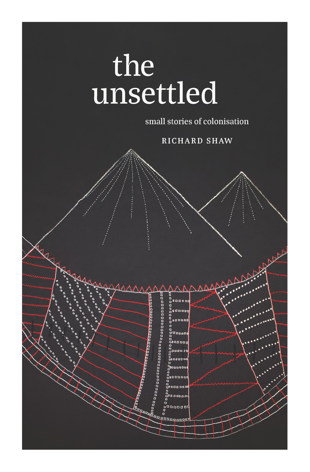Sam Iti Prendergast reviews Richard Shaw’s The Unsettled: Small stories of colonisation for New Zealand Journal of History:
‘FAMILY HISTORY often receives short shrift. In Richard Shaw’s The Unsettled, the familial is political: family history takes centre stage as Shaw highlights the power of personal histories in reflecting, creating, and bolstering nation state mythologies. Across nine concise chapters, featuring multiple interviews, Shaw interrogates the stories that Pākehā tell about their lives, their ancestors, and their relationships to the long and ongoing history of colonization. More specifically, Shaw asks how, in the process of remembering, forgetting, and narrating the past, Pākehā have grappled with and justified their continued presence on – and ownership of – Māori land.
In a political climate where the mere mention of the word ‘settler’ can sometimes seem to cause deep distress, Shaw invites readers to lean into the discomforting realities of colonization. Shaw is well-positioned to take up this work. As a Pākehā academic, and the descendant of a man who participated in the invasion of Parihaka, Shaw can address his intended audience as a peer. Shaw draws on this positionality with tact: this book is not a reprimand, he assures his readers, but an invitation to ask critical questions about the mythologies that lurk in our own communities and family albums.
Each of Shaw’s chapters addresses a central question about how we narrate the past, and, therefore, about how we do (or do not) come to live with it. In Chapter 1, ‘Find the Beginning’, he experiments with multiple potential starting points for a book about grappling with colonization: nineteenth-century departures from European homelands; nineteenth-century settler legislative maneuverers designed to rob Māori of land title; or, in a different vein, twenty-first century responses to Shaw’s former work, about his great-grandfather’s role in ‘the colonial treatment meted out to Taranaki Māori’ (p.21). Together, they illustrate something central to Shaw’s argument – that to move towards a more honest history of colonization in Aotearoa, long-held beliefs and rigid Pākehā narratives will need to be unsettled.
At times, Shaw’s work reminds me of a question that the late Haunani-Kay Trask posed in relation to her home islands of Hawai’i: what do we protect when we safeguard the narratives that sustain settler innocence? As someone who teaches New Zealand history at a New Zealand university, I often encounter students who view their own family involvement in colonial settlement with a large degree of shame. Shaw is interested in how we might move past unproductive shame and defensiveness – the type that leads us to bunker down – and towards a more rigorous endeavour to know the past.
The book’s methodological strength lies in its treatment of settler family narratives as frameworks through which colonial occupation is legitimated and sustained. Shaw demonstrates how these stories work to absolve contemporary settlers of historical guilt, for instance, through recurring tropes of Māori-Pākehā ‘mateship’. In Chapter 4, ‘How to Forget’, Shaw departs from the familial to critique the sweeping and pervasive myths – cannibalism, Māori elitism, ‘hand outs’ – that pop up when Pākehā perceive Māori as a threat to their ongoing comfort. The chapter provides compelling analysis of parliamentary submissions opposing the 2015 Ōtorohanga high school petition for a national day of remembrance for the New Zealand Land Wars. The chapter also includes thoughtful engagement with work by Rachel Buchanan, Charlotte Macdonald, and Avril Bell on memory, commemoration, violence, and national mythologies. Occasionally, Shaw’s sharper observations about myth and the nation receive too little airtime, as at the end of Chapter 2 when he reflects on Māori as ‘the absence that is always present’ in settler narratives (p.59).
On a personal note, as a reader of Māori and Pākehā descent, I find Shaw’s almost exclusive focus on Pākehā narratives both understandable and limiting. While Shaw explains his focus on Pākehā family histories as a decision to shine a ‘bright light’ on the problem (p.36), he may have missed an opportunity to probe the grey space that many of us occupy as Māori with Pākehā and other tauiwi ancestors. A Pākehā/ Māori binary never fully accounts for the messiness of what colonization produces on Indigenous lands. And while I agree with Shaw that it should not be the job of Māori to deal with Pākehā feelings of guilt, Māori have distinct contributions to make in any conversation about how we ought to reckon with the violence of the past.
The Unsettled makes a valuable contribution to our understanding of how colonial legacies operate through intimate, familial channels. Shaw’s willingness to ‘let emotion in’ (p.127) provides an important example for those willing to grapple with their colonial inheritance. His practical suggestions for moving beyond guilt – ranging from ‘sort your attitude out’ to writing ‘family histories that include colonial context, as well as other stuff you’d rather not know about’ (p.175) – offer concrete pathways forward. While focused specifically on the New Zealand context, Shaw’s framework for examining settler family histories as sites of both colonial perpetuation and potential transformation will resonate with scholars working in other settler colonial contexts, as well as a range of New Zealand readers open to honest reflection.’


